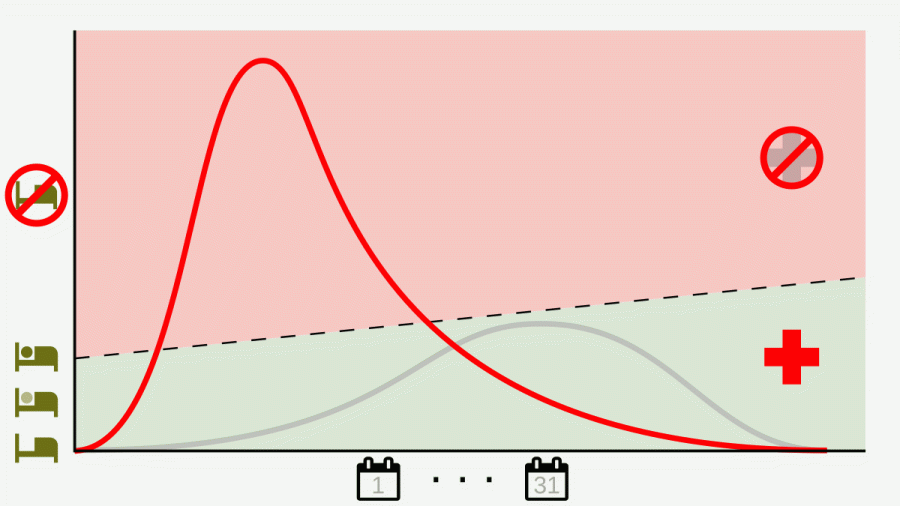The Pandemic Isn’t Over Just Because You’re Over It
Inhibiting new infections to reduce cases (vertical axis) at any specific time is known as flattening the curve. It allows healthcare services to better manage the same volume of patients by spreading out demands over time (horizontal axis). Dashed line indicates healthcare capacity.
January 20, 2022
If you look at the news these days, Covid-19 is dominating the headlines. We’re two years into this pandemic and yet there are still multiple unknowns and uncertainties regarding this disease. With the recent emergence of yet another deadly variant, many are beginning to question how we move forward in a diseased world. Some call for more lockdowns in order to protect overwhelmed hospitals and prevent spread, while others argue that because Coronavirus will likely become endemic we should remove all guidelines and “learn to live with it”. Both of these options are rather extreme, and both potentially risk the health (mental and physical) of millions of people. With the rapid spread of misinformation and the rampant politicization of a public health issue, it can be hard to know what you can do to help protect yourself and your loved ones. So what do we do?
The most reliable guidance comes from the CDC. For the duration of this pandemic wearing masks and social distancing when in crowded and indoor situations has been recommended by both physicians and public health experts. Vaccinations have also been recommended since their creation in December of 2020. Now available to almost everyone ages 5 and up, vaccines remain the strongest and most effective method of protecting yourself and those around you from serious Covid-19 infection and complications (CDC). St. Mary’s County is currently at critical transmission levels according to the CDC, which means it is recommended that everyone wear a mask whenever they’re inside, regardless of vaccination status. Early data suggests that surgical or N95 masks offer the best protection against the spread of the Omicron variant over cloth masks. Additionally, it is recommended that people planning on traveling or experiencing minor symptoms should take an at-home rapid Covid test. These tests are now being provided to households free of charge at the link below and help prevent the spread of disease by informing people of their status.
As LHS students, we have a responsibility to do everything we can to protect one another and our community from the spread of disease. So please get vaccinated if you can, wear your mask (over your mouth and nose) when indoors or around large groups of people, and keep yourself updated on State and Federal guidelines. Stay home if you feel sick and notify those around you along with the health department if you get diagnosed with Covid. Most of all, stay hopeful. These are daunting times, but I know that as a community we can and will continue to keep each other safe and as healthy as possible.




